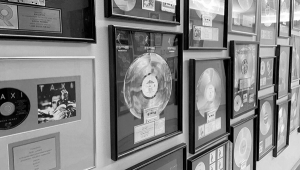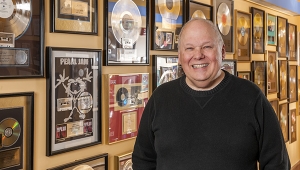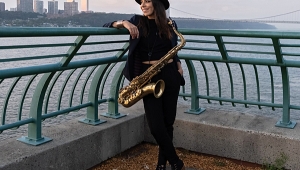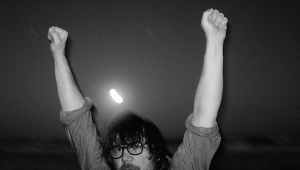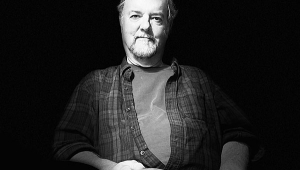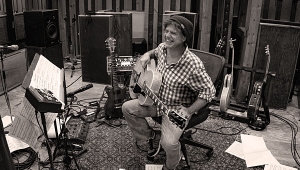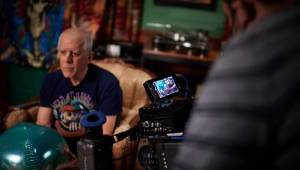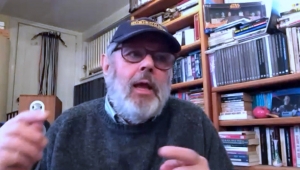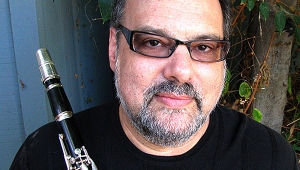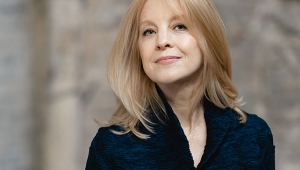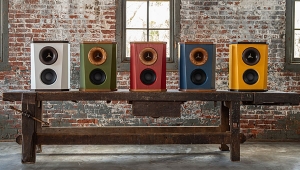| Columns Retired Columns & Blogs |
Amazing Stuff: Klaus Heymann of Naxos Sam's Naxos Recommendations
Sidebar: Sam's Personal Naxos Recommendations
Telemann: Born four years before J.S. Bach, Georg Philipp Telemann (1681-1767) outlived him by 17 years. When Telemann died in 1767, age 86, Haydn was 35 and Mozart was 11. And Klaus Heymann is right: Telemann must have written day and night. Music de Table, Tafelmusik, Table Music—whatever. This is great music—the ultimate dining and baroque musical experience, in (so far) four volumes, performed by the Orchestra of the Golden Age. More than four hours of delicious light baroque dining music. If you have a changer, load all four CDs (8.553724, 8.553725, 8.553731, 8.553732), and Telemann will entertain you for the whole evening. Want more? Try the Suites (8.553791), with the Northern Chamber Orchestra conducted by Nicholas Ward. Enjoy. And listen for the influence of Klezmer music!
Ever hear of German composer Christian Cannabich (1731-98)? (That's pronounced Cann-a-beesh, but you can call him whatever.) I hadn't either, until Heymann sent me Symphonies 59, 63, 64, 67, and 68 (8.553960). A lot more great works where those came from, he says. Spirited performances by the Lukas Consort, directed by Victor Lukas.
Often, a Naxos disc can be a revelation. Like Symphonies, Vol.2, by Joseph Martin Kraus (1756-92), performed by the Swedish Chamber Orchestra under Petter Sundkvist (8.554472). Kraus was a German-born conductor who made his career in Sweden, entertaining King Gustavus III. (Lars, take note.) The first movement of the Symphony in C is breathtakingly beautiful and superbly recorded: 72:13 of bliss.
So many Swedes—it must be because Klaus sells so many discs in Sweden. Finland, too. Don't let the Swedes and the Finns monopolize this disc. Bernhard Henrik Crusell (1775-1838) is featured on 8.554144 with three clarinet concertos performed by Per Billman, principal clarinetist of the Royal Opera House, Stockholm, accompanied by the Uppsala Chamber Orchestra with conductor Gérard Korsten.
Not a Swede this time: Bohemian-born Franz Krommer (1759-1831) was once thought to rival Haydn and Beethoven in popular esteem. Want to hear why? Get Partitas for Wind Ensemble (8.553868), performed by the Michael Thomson Wind Ensemble.
If you like clarinet, try Carl Stamitz (1745-1801): Clarinet Concertos, Vol.2 (8.554339), with Kálmán Berkes, clarinet, and the Nicolaus Esterházy Sinfonia, Budapest. These are among the first clarinet concertos ever written.
While we're in the 18th century, you probably want the violin concertos of Viennese composer Leopold Hoffman (1738-93), performed by Lorraine McAslan (violin), Tim Hugh (cello), and the Northern Chamber Orchestra conducted by Nicholas Ward (8.554233). You shouldn't listen to Haydn and Mozart all the time, you know. Many of this composer's works survived in only single copies.
Do the Viennese have a special way with music? Of course. Take the Vienna Brahms Trio in the Piano Trios Opp.63 and 80 of Robert Schumann (8.553836). This is the finest chamber-music release I've heard all year. The Viennese capture so well what the liner notes refer to as Schumann's "vivid sense of tonal colors."
Johannes Brahms arranged some of his finest works for piano duet—four-hand piano music. Get Vol.3 (8.553654), which contains a four-hand arrangement of my favorite, the Sonata in f, Op.34b, and the Variations on a Theme by Joseph Haydn, Op.56b. Vol.4 (8.553726) is nice too: the two Serenades, with pianists Silke-Thora Matthies and Christian Köhn.
Were there other late-19th-century Czech symphonists besides Dvorák? Well, yes—Zdenek Fibich (1850-1900), who wrote three symphonies, the first two of which are heard on a disc with the Razumovsky Symphony conducted by Andrew Mogrelia (8.553699). I won't say the music is memorable, but it's worth a listen if you like late Romantic symphonies.
"In one ear and out the other" would also describe the music of Alexander Glazunov (1865-1936). Our friend Alexander Anissimov is heard with the Moscow Symphony in The Seasons and Scènes de Ballet (8.553915). If you like Tchaikovsky, try it. An even better-recorded Glazunov disc is 8.553857, with Suite Charactéristique, Le Chant du Destin, and Préludes, again with the Moscow Symphony, this time conducted by Igor Golovschin. The Prélude Op.85 No.2, in memory of Rimsky-Korsakov, is a must for all fans of Russian music.
We'll skip out of sequence to Sergei Rachmaninoff. Naxos has one of the great Rachmaninoff pianists in Turkish-born Idil Biret. I think this is the finest recording in the catalog of the Piano Sonatas 1 and 2 (8.553003). Ms. Biret is wonderful with Chopin, too.
Two more Biret/Rachmaninoff discs: Piano Transcriptions & Arrangements (8.550978) contains Rachmaninoff's renderings of Bach, Schubert, Mendelssohn, and more. A wonderful disc, and worth having just for the 2:11 at the end: the composer's transcription of "The Star-Spangled Banner." He first performed it in Providence, Rhode Island on December 8, 1918, a year after he fled Lenin and the Bolsheviks. The younger Rachmaninoff is heard on 8.553004, which includes the Morceaux de Salon, Op.10, written in 1894, when the composer was fresh out of the conservatory.
I mentioned Alexander Anissimov's Rachmaninoff Symphony 1, with the National Symphony of Ireland. This may be the best-played and best-recorded Rachmaninoff First on disc (8.550806). A sweeping performance of the Caprice Bohémien fills out the generous 69:14 playing time. Kudos for this one to recording engineer Tim Handley, who's engineered quite a few Naxos discs.
Edward Elgar is John Atkinson's favorite composer, and one of mine, too. Falstaff may not be Elgar's greatest work, but 8.553879 might be the finest recording of it in the catalog—the English Northern Philharmonia is heard, conducted by David Lloyd-Jones. The music is a little fattening.
For something leaner, try Richard Strauss's Le Bourgeous Gentilhomme, performed by the Melbourne Symphony Orchestra, conducted by Michael Hálasz (8.553379). I find the recording slightly opaque, but the performance is exquisite.
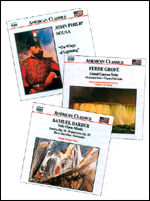 British composer Arnold Bax (1883-1953) followed in Elgar's footsteps. Never did quite fill Sir Edward's shoes, perhaps, but Bax's music is quite appealing nonetheless. Early in his career he composed a series of tone poems, of which November Woods is one of the most famous. It is heard on 8.554093, along with Symphony 2. The Royal Scottish National Orchestra again, conducted by David Lloyd-Jones, the same chap who gives us the splendid Elgar Falstaff. Hats off again to producer Tim Handley.
British composer Arnold Bax (1883-1953) followed in Elgar's footsteps. Never did quite fill Sir Edward's shoes, perhaps, but Bax's music is quite appealing nonetheless. Early in his career he composed a series of tone poems, of which November Woods is one of the most famous. It is heard on 8.554093, along with Symphony 2. The Royal Scottish National Orchestra again, conducted by David Lloyd-Jones, the same chap who gives us the splendid Elgar Falstaff. Hats off again to producer Tim Handley.
Don't let the last name fool you—Gerald Finzi (1901-56) was one of the most English of composers. Was ever music so gentle, so easy on the ear? His Clarinet Concerto is a special delight as performed by Robert Plane, with the Northern Sinfonia conducted by Howard Griffiths (8.553566). Fillers include A Severn Rhapsody. A must for all fans of English music, produced and engineered by Tim Handley.
I mentioned that Georg Tintner died at the age of 82. He should have had a more illustrious recording career, but don't blame Klaus. With Symphonies 1, 3, and "00" still to be released, Tintner's complete cycle of all 11 symphonies of Anton Bruckner will be well worth owning. Start, perhaps, with Symphony 4, the "Romantic," in the 1878-80 Haas version (8.554128). Tintner conducts the Royal Scottish National Orchestra.
Hungarian Jenö Jandó may be the most recorded pianist of modern times—possibly the most recorded pianist ever. Klaus Heymann thinks the world of him, as became apparent at breakfast before our interview. Why is Jandó so special? Part of it is the pianist's full, rich sound. There are so many Jandó discs on Naxos, all recommendable; a good place to start might be Beethoven's Bagatelles and Dances, Vol.1 (8.553795), which starts off with a superb performance of "Für Elise," one of the best-known melodies in classical music.
This may be an audiophile crowd, but can your system do Niagara Falls? Find out with a volume of Naxos' American Classic series: Orchestral Works of Ferde Grofé (8.559007), with the Bournemouth Symphony Orchestra conducted by William T. Stromberg. The disc includes three suites: Mississippi, the well-known Grand Canyon, and Niagara Falls, written in 1961, toward the close of the composer's career. It's the last that will excite audiophiles—especially "Thunder of the Waters" and "Power of Niagara." Lars and the Brass Ear flipped when they heard this. Don't crank up the sound too loud. I warned you! This killer disc could literally take out your system.
While awaiting 16 CDs of John Philip Sousa's band music, I have three other Sousa discs to recommend, Keith Brion conducting the Razumovsky Symphony on all three. On Stage (8.559008) features music for the musical theater. Dig band 6 of the 1897 operetta, The Bride Elect: it's called "The Whiskies—Scotch, Irish, Bourbon, and Rye." At the Symphony (8.559013) consists of marches and other pieces, with a great rendition of "The Stars and Stripes Forever." I sometimes send Marina marching off to work in the morning with this disc. And On Wings of Lightning (8.559029) is mostly marches. Great fun.
If I dwell on Naxos releases, it's because they're so good, so cheap, and so many of them tend to not get noticed; little hype surrounds their release.
And many record stores do a poor job of stocking Naxos, some adding insult to injury by jacking up the price from $6.99 to $7.99. If you can't find these discs in your local record store, try ordering from your favorite Internet source. A 50-cent discount is sort of cheesy—look for at least $1 off.
And Happy Listening!—Sam Tellig
- Log in or register to post comments

